
BY DAN GOLDBERG
|
With help from Myah Ward
YOU’RE NOT SAFE — Vice President Mike Pence has often said that the latest surge in infections is a function of only a few hotspots, select counties in certain states that can be targeted and extinguished.
In reality, the virus is raging out of control in regions across the country. It isn’t a function of more testing, as President Trump claims. And it isn’t confined to one region, or places governed by one political party.
While Arizona, Florida and Texas are in the spotlight, several other states are reporting alarming numbers, begging residents to change their behavior and warning of dire consequences if they do not.
State officials in Oregon asked residents today to avoid indoor gatherings of more than 10 people and said at the rate the virus is spreading, daily infections could triple in the next month. If that were to happen, “we’d quickly fill hospitals across the state,” said Dean Sidelinger, state health officer.
Oregon’s reopening began on May 15 but the date is less important than people’s behavior, said Patrick Allen, director of the Oregon Health Authority. Too little social distancing and mask wearing has helped fan the spread.
In South Carolina, nearly half of all infections have occurred in just the last two weeks and more than 17 percent of tests are now coming back positive.
In Alabama, state health officer Scott Harris said Thursday he is “extremely concerned” about hospital capacity. The state of 5 million people has fewer than 200 ICU beds available, less than at any time since the pandemic began. “This is not sustainable for very long,” Harris said.
Problems are also growing in the Midwest. Ohio reported a record number of new infections today and the number of patients in ICU beds has reached new highs. Republican Gov. Mike DeWine, who has been praised for his deliberate handling of the pandemic, mandated masks for the state’s three largest counties.
In Indiana, state health commissioner Kristina Box said Wednesday that she is concerned that the percentage of positive tests has steadily increased over the last week.
In Wisconsin, the percent of positive tests more than doubled over the last couple weeks, and a record number of daily infections were reported on Thursday and then again today.
The one constant message from public health and elected officials in all these states is that the variable that matters most is personal precaution. The virus is everywhere in the country, and it’s spreading at an increasing rate. No matter how careful your governor is, or what party is in charge, or what coast you live on, or if you’re nowhere near a coast, the advice about mask wearing and social distancing remains the same.
Welcome to POLITICO Nightly: Coronavirus Special Edition. The weekend's here, and so Renu's inbox, despite her well-deserved break. Drop us a line. Reach out: rrayasam@politico.com or on Twitter at @renurayasam.
A message from PhRMA:
America’s biopharmaceutical companies are sharing their knowledge and resources more than ever before to speed up the development of new medicines to fight COVID-19. They’re working with doctors and hospitals on over 1,100 clinical trials. Because science is how we get back to normal. More.
| FIRST IN NIGHTLY |
MORE NETFLIX, LESS CHILL — Democrats and Republicans have responded to the pandemic quite differently, and that even extends to what people are doing in their bedrooms. Simply put, there’s a sizable partisan gap in how the coronavirus is affecting Americans’ sex lives.
The Kinsey Institute recently conducted a study to explore the impact of the pandemic and the resulting lockdown and social distancing measures on people’s sex lives and relationships. Starting in mid-March, just as widespread social restrictions began being implemented across the country, Kinsey surveyed more than 2,000 adults, writes Justin Lehmiller, a research fellow at the institute. Some were single, some were in relationships, some were married; some lived alone, some cohabited. Their ages ranged from 18 to 81.
Liberals were significantly more likely than conservatives to report a decline in their sex lives since the start of the pandemic. They reported less desire for sex in general, a lower frequency of sex with a partner and a lower likelihood of experimenting with new sexual activities at the time when most of the country was locked down. Conservatives, meanwhile, were significantly more likely than liberals to say the pandemic hasn’t affected their sex lives at all. And importantly, this holds true regardless of a participant’s relationship status or living situation: Single liberals were less sexually active than single conservatives, just as cohabiting liberals were less active than cohabiting conservatives.
HAPPENING TUESDAY 9 a.m. EDT - A PLAYBOOK INTERVIEW WITH AUSTIN MAYOR STEVE ADLER : As coronavirus cases continue to spike in Texas, the city of Austin is preparing to turn the downtown convention center into a field hospital. Join Playbook authors Anna Palmer and Jake Sherman for a virtual interview with Austin Mayor Steve Adler that will reveal how he’s navigating the rapid jump in the number of cases, how cities are working with state and local governments during the pandemic, and how a city known for its restaurants, bars and concerts is planning for what's to come. REGISTER HERE.
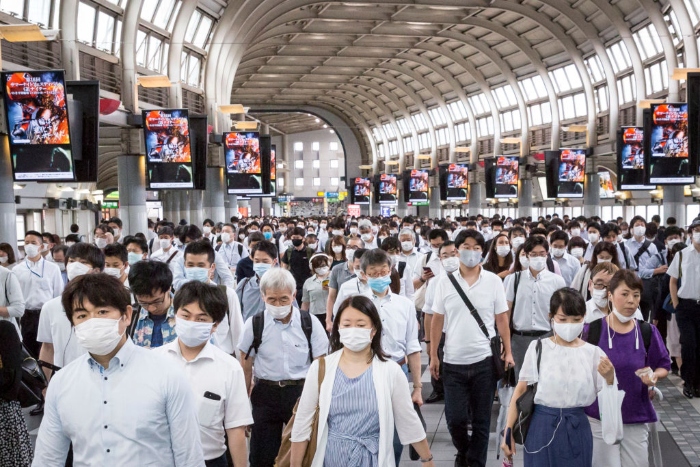
Commuters wearing face masks pass through Shinagawa train station in Tokyo. | Getty Images
| COVID-2020 |
‘YOU GET MADE FUN OF’ — Inside the Trump campaign’s headquarters this week, a team of cleaners scrubbed down surfaces and disinfected equipment — a recognition that coronavirus has found its way into the heart of the president’s reelection bid, regardless of Donald Trump’s public dismissals of recent risk, health care reporter Dan Diamond writes.
The campaign’s headquarters — located on the 14th floor of an Arlington, Va., office building that shares space with multiple businesses — was shut down for its first deep cleaning in weeks after a senior campaign official tested positive for the virus. The decision to conduct the cleaning came after two months of flouting the Trump administration’s own public health guidance: There are no face coverings or temporary barriers between desks at headquarters, and leaders have limited efforts to implement social distancing.
The campaign’s lack of safety protections were visible during Vice President Mike Pence’s visit to the office last month, during which he posed for a photo with more than 70 campaign staff, closely packed together and without wearing face coverings — an image that infuriated local officials, who called on Virginia Gov. Ralph Northam to take action and enforce state public health orders on universal masking indoors and social distancing. But Northam, a Democrat, declined to do so.
Facing no threat of enforcement, the Trump campaign has continued to make its own rules on coronavirus protections, said the individuals, who requested anonymity to speak freely. For instance, staff have been told to wear masks outside the office, in case they’re spotted by reporters, but they’ve been instructed that it’s acceptable to remove them in the office, the individuals said, adding that staff also publicly joke about the risk of coronavirus and play down the pandemic’s threat.
“You get made fun of, if you wear a mask,” said one person. “There’s social pressure not to do it.”
| AROUND THE NATION |
YOU DON’T HAVE TO GO HOME BUT YOU CAN’T STAY HERE — South Carolina’s Republican Gov. Henry McMaster issued a “last call” executive order today, banning the sale of alcohol at restaurants and bars after 11 p.m. starting Saturday. If the establishments are caught handing out booze once the local TV news starts, they could temporarily lose their liquor licenses, Nightly’s Myah Ward writes.
This small step toward curbing the spread of the virus is a fairly big one for McMaster, who was one of the last governors to shut down his state when the virus first raged across the country this spring. And he was among the first to begin reopening, on April 20.
South Carolina surpassed 52,000 positive coronavirus cases this week. In early May, when the state reopened its gyms, pools and restaurant dining rooms, cases were below 8,000.
In June as the count surged, McMaster refrained from walking back on reopening and said closing businesses “is not the answer.” Instead, he said the pandemic comes down to “individual responsibility,” and that South Carolinians need to “be smart.” He added, “There’s a lot of stupid floating around out there.” By the end of the month , McMaster was pleading with his citizens, “For goodness sake, wear your mask, keep that distance.”
It didn’t work. Tourists and residents hit the beaches and filled restaurants and bars in tourist destinations like Myrtle Beach and Charleston. Today, one in every 60 Charleston County residents are confirmed as having had coronavirus — nearly 7,000 cases. And West Virginia Gov. Jim Justice warned people to “think twice” before visiting Myrtle Beach.
“If you’ve gone to the beach, you’ve likely come in contact with somebody who is positive, but perhaps asymptomatic,” Joan Duwve, director of public health with the South Carolina Department of Health and Environmental Control, said on June 26.
Now, McMaster has found a new culprit for the spread of Covid-19: young people. “It’s time for our younger adults to behave like mature adults,” he said today. “This is very serious.”
He’s not entirely wrong: People between 21 and 30 represent 22 percent of the known cases in the state. And in recent weeks, the health department reported a 966 percent increase in cases among people from 11 to 20 and a 413 percent increase in people from 21 to 30.
Even so, McMaster isn’t following the example of Florida and Texas, which have closed bars. And he has yet to issue a statewide mask mandate.
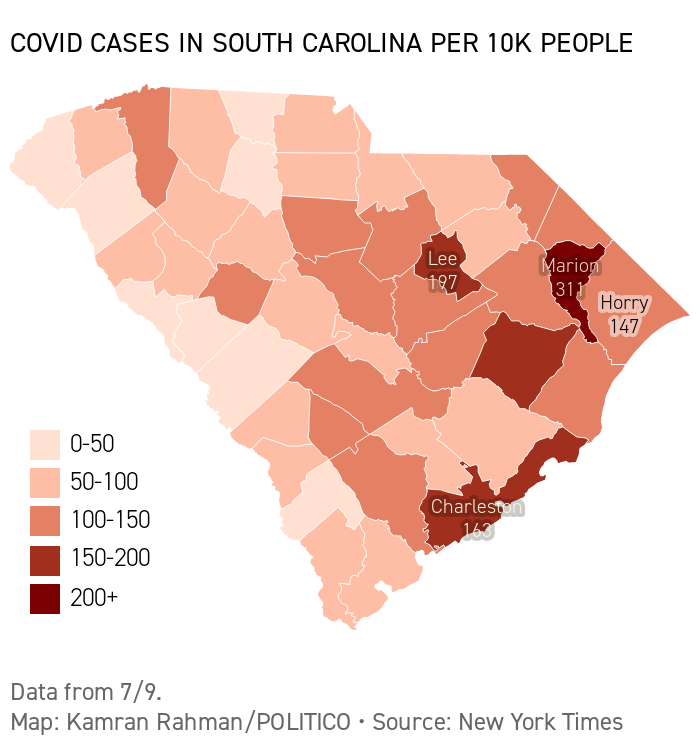
None of this seems to bother Ryan Heath, POLITICO’s Global Translations author and a frequent Nightly contributor. He traveled to Charleston this week, and he’s staying put. Ryan talked with Myah about what he’s seeing on the ground. This conversation has been edited:
What’s it like in Charleston?
I headed down from New York. It really is like it just gets looser and looser as you go South. I flew in from Atlanta after having begun on Amtrak. My flight from Atlanta to Charleston was on Delta. The Delta Lounge required masks. The wifi password was “wearmask.” The rules could not be clearer, but I had trouble spotting a person wearing one. On the flight itself, the other passengers in Row 13 removed their masks after sitting down, prompting a rebuke from the female flight attendant, and a “whatever” and eye roll from the man next to me. He did eventually wear the mask, at the urging of his female companion.
And then once you get here, it’s a bit strange.
We arrived at a restaurant, and there was literally only one party in the entire restaurant, and they were like, “Oh my god, other people,” and made a joke about it when we arrived. We sat outdoors.
But then a nearby bar indoors was completely packed.
Did anything else stand out?
There are still a lot of people wearing masks. I don't want to say it’s like everyone’s running around like a frat party. But there is definitely the sort of situation where people wear it when they are told to wear it. There was an elevator that could fit eight people in it to go to a bar last night, and eight people got in it. We were just horrified. We just watched them, and were like, No we’ll take the stairs. And so people are quite OK with flouting whatever rules there are. So I can imagine that is going to bring more tension. If the numbers keep going crazy, then that is going to become a flashpoint.
The streets of Charleston are perceptibly empty most hours of the day and night this week. Typically, you couldn’t pay Southerners to move around outdoors in the heat of the day, but this feels different: It’s the lack of traffic, the lack of movement in general, the surprise at seeing a bustling shop, then realizing it’s a barber shop full of men only.
Men who won’t be told what to do — call it toxic mask-ulinity — seem likely to emerge as a fault line here in coming weeks.
How about the beaches?
Temperatures neared the 90s today, and it felt much hotter. Folly Beach was predictably busy, for miles. People were spread out in their groups — it’s easy to socially distance on a huge beach. Electronic billboards already advertise the governor’s new post-11 p.m. alcohol ban.
| ASK THE AUDIENCE |
Nightly asked you: How do you think schools and day cares should reopen this fall, if at all? Below are some of your lightly edited responses.
“Wherever possible, I recommend staggered-day sessions, so students get at least a half-day of formal classroom instruction three or more days a week. I taught for four years on staggered sessions. It took planning, but by mid-September, it was running smoothly. It’s worth a try.” — Diane E. VanderHorn, retired teacher, Freehold, N.J.
“Eighty percent of time should be spent learning outdoors, until weather forces indoor classes. Then schools should use a hybrid model two days a week and every other Monday. Online learning and written assignments for the rest. This would work well in rural communities where the land surrounding schools can be used for outdoor classrooms, less possible in urban areas.” — Anne Haddad, consultant, Northfield, Minn.
“School needs to reopen with masks mandatory for both staff and students and with social distancing in place. School districts will need more financial support from the federal government to make reopening as safe as possible. My state and district have been developing plans to accomplish this. As a teacher, I know school is a safe space for my students. For some students, school provides their only meals of the day.” — Alex Ward, high school teacher, Champaign, Ill.
“It's very difficult to say what should happen now, even though it will make it tough on teachers and staff not to know until the last minute. But if a state is spiking in cases, then schools should not open. Within a month or so of opening, it will be flu season and it could turn into a catastrophic event.”
— TERRY SNYDER, SCHOOL LIBRARIAN, NORWALK, OHIO
|
“They should not open until there is either a cure or a vaccine. If my 11-year-old got the virus, he could die.” — Gary Miller, retired, Juneau, Alaska
“Difficult question. As a school nutrition manager (read: glorified lunch lady), I know that these places provide necessary resources to many students in the form of meals, supervision, structured play, etc. However, I also see hundreds of students gathered simultaneously in an environment perfectly conducive to the spread of a virus. Socioeconomic status seems to be the deciding factor for success in an online format, so I guess a hybrid approach might be most fair?” — Logan Martin, nutrition services manager, Phoenix
“Reopen fully, with little to no restrictions. Society will pay a huge price in the future without reopening. Kids are the safest group in America.” — Bill Musolf, sales, Santa Clarita, Calif.
GET VIP ACCESS TO AN INTERVIEW WITH KERRY WASHINGTON: Women Rule Editorial Director Anna Palmer will host a conversation with star actress, producer and director Kerry Washington; Dale Ho, director of the ACLU's Voting Rights Project; and Brigitte Amiri, deputy director at the ACLU's Reproductive Freedom Project focused on "The Fight," a documentary that chronicles four cases that the ACLU brought against the Trump administration. Register here for exclusive access to the conversation next week before it's made available to the general public.
| PUNCHLINES |
‘AS IF 2020 WASN’T THROWING ENOUGH CRAZY AT US’ — Matt Wuerker takes us through jokes and cartoons on the latest tell-all Trump book, the national fight over statues, Covid-19, Kanye West and much more, in the latest Punchlines.
| NIGHTLY NUMBER |
67 percent
The proportion of respondents in an ABC News/Ipsos poll released today who disapproved of “the way Donald Trump is handling the response to the coronavirus.” Only 33 percent approved — the widest gulf in public sentiment since ABC News and Ipsos started surveying on the pandemic in March.
|
| PARTING WORDS |
AIRPLANE! Renu, your vacationing host, emails from Atlanta:
I had been dreading the idea of traveling with two kids under the age of two during a pandemic. The last time I got on a plane was in 2019, for a solo work trip to Washington. As much as I love travel, I would have happily skipped a pandemic plane trip right now. But my brother is getting married on Saturday in a small, outdoor ceremony. Covid already canceled the 300-person Indian festivities. I couldn’t miss the wedding of my only sibling and best friend. So we flew.
I expected the worst, especially because it was the July 4 weekend: crowded planes, stressed-out staff and maskless travelers. But our journey was surprisingly smooth, though eerie. In Austin, there were only a few people to check us in and handle our luggage. I was allowed to bring a large tube of liquid hand sanitizer through security. People largely kept their distance during the boarding process and the plane wasn’t too crowded.
Once we landed, there were no signs of Atlanta’s distinction as the world’s busiest airport. The train to baggage claim was empty and our luggage arrived at the carousel before we did. The journey would have been pleasant, if the emptiness were not a reminder of the pandemic’s devastation.
A message from PhRMA:
America’s biopharmaceutical companies are sharing their knowledge and resources more than ever before to speed up the development of new medicines to fight COVID-19. They’re working with doctors and hospitals on over 1,100 clinical trials.
And there’s no slowing down. America’s biopharmaceutical companies will continue working day and night until they beat coronavirus. Because science is how we get back to normal.
See how biopharmaceutical companies are working together to get people what they need during this pandemic.
And there’s no slowing down. America’s biopharmaceutical companies will continue working day and night until they beat coronavirus. Because science is how we get back to normal.
See how biopharmaceutical companies are working together to get people what they need during this pandemic.
Did someone forward this email to you? Sign up here.
Follow us on Twitter
Renuka Rayasam @renurayasam
|
FOLLOW US
|
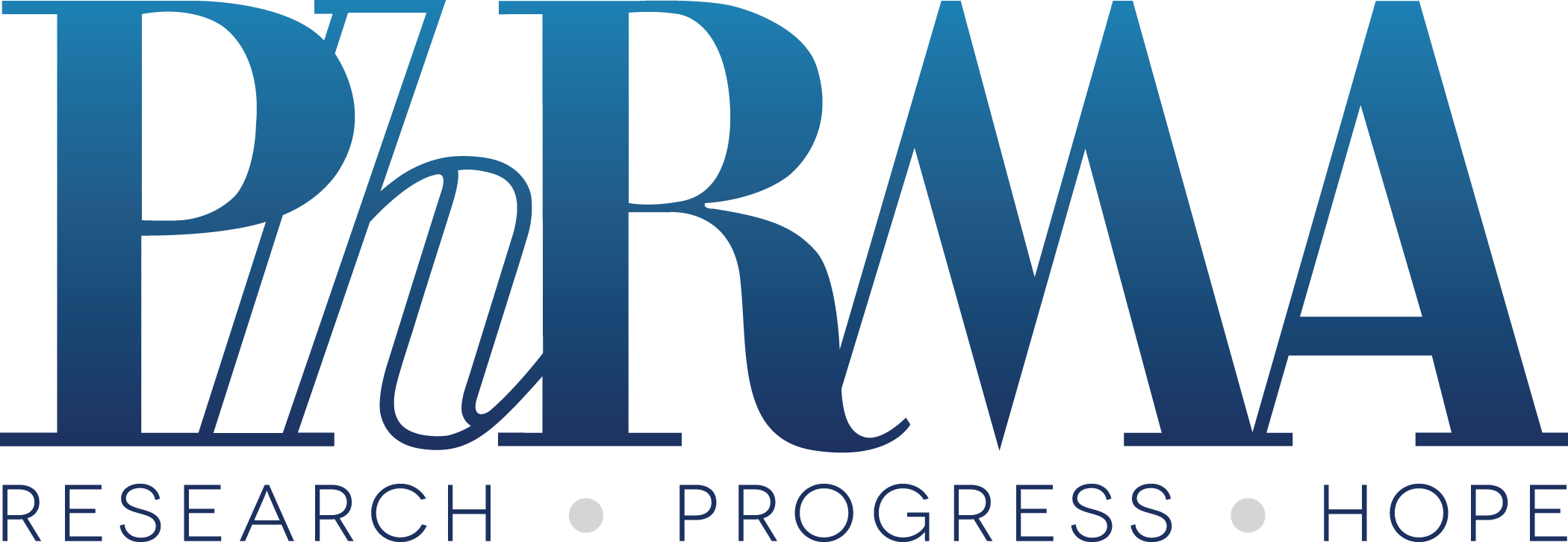

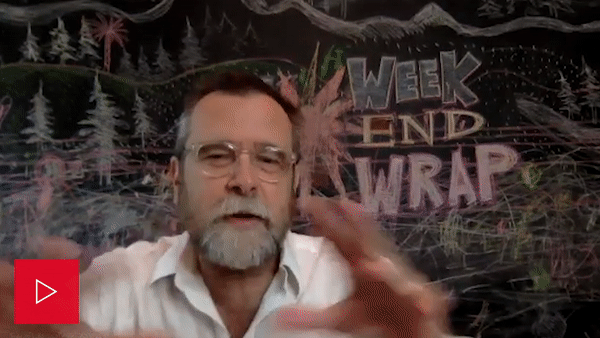
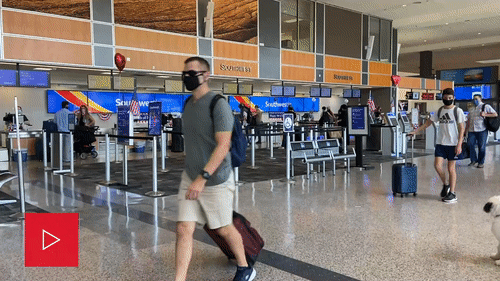

No comments:
Post a Comment
Note: Only a member of this blog may post a comment.